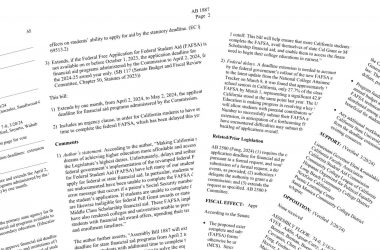Although it’s still underlined red when typed into a word processor, “vape” is the Oxford English Dictionary’s 2014 word of the year.
Like other words of the year, according to Oxford English Dictionary’s website, vape was chosen by lexicographers—the people who keep the dictionaries current— not particularly because it’s a proper English word, but because it attracted a noteworthy amount of attention during 2014, reflecting the ethos, mood and preoccupations of the year.
According to the OED website, “The OED requires several independent examples of the word being used, and also evidence that the word has been in use for a reasonable amount of time.”
This may be a word that was extremely popular for a short period of time, such as the 2013 candidate “Harlem Shake,” which was used heavily during the month of February of that year. It could be a word that has many uses and has been used over a long period of time, such as 2009’s winner “unfriend,” which has become a part of our regular online lingo. “Selfie,” the OED word of the year for 2013, seems as if it’s here to stay; use of the word increased exponentially until March 2014 and has been referenced consistently in news headlines ever since, according to Google Trends.
“Selfie was the perfect word, it represents our whole way of thinking,” Heloiza Herscovitz, a Cal State University Long Beach professor of literary journalism, said. “It’s the ‘me, me, me, me, me’ era. It’s all about ‘me and my friends, I don’t care about you, I don’t care about where I am,’ you can have someone dying here, and you could be taking a selfie, but that’s what people do!”
Hercovitz observed that “vape” became popular in a different manner, however. Herscovitz said the widespread use of the word is a product of smokers’ rejoicing in a more acceptable way of public nicotine consumption.
“I think it’s people manifesting their individuality and their right to do what they want to do,” Herscovitz said. “It’s interesting that they picked this word.”
This selection comes after a year that has made many significant changes in smoking culture. Since 2012, the nation has made a significant shift away from traditional cigarettes. CVS stopped selling cigarettes in September, and e-cigarette stores and vape lounges have proliferated across the nation— according to an October 2013 article by Bloomberg Businessweek, there were over 3,500 vape shops in business nationwide.
In 2013, refillable vaporizer sales racked up to $1.7 billion. Although Bloomberg reported that e-cigarette sales have fallen slightly during 2014, the word has become a shared term between both e-cigarette users and marijuana users, for whom “vaping” is one of many ways of smoking.
The topic received a lot of local discussion during the first half of 2014. More than 25,000 youths who never smoked a conventional cigarette used an e-cigarette in 2013, according to a 2014 report from Centers for Disease Control. In March, the Long Beach City Council voted to categorize electronic cigarettes with all other tobacco products.
OED’s choices for word of the year serve as somewhat of a social commentary. According to a National Science Foundation special report on Linguistics and Language Change, social, economic and political pressures result in language changes. New technology, such as the radio and Facebook, has drastically influenced our use of language.
In the past decade, the words of the year have reflected an increasing influence of the digital world on our vocabulary, starting with “podcast” in 2005. For the past three years, digital words have dominated the competition, being ‘GIF’—used as a verb— in 2012, and “selfie” in 2013. This year, “vape” won narrowly ahead of “bae,” a term that spread predominantly by the younger demographic not through mouth, but through keyboard. Vape serves as not only a testament to the use of vaporizers, but also the shift in marijuana use in several states.
“It definitely indicates that English is much more of a technology oriented language these days,” Tim Henry, a part-time lecturer of linguistics at CSULB, said. “It shows the willingness of academia to adapt new technological things … in the humanities and social sciences, that type of change does not come quickly.”
The lexicographers of Oxford consider “corpus evidence” when choosing their words of the year. Henry said that corpus linguistics is a fairly recent field that came about in the ‘90s, and it looks at real data, such as newspapers, magazines, academic journals and spoken language, to analyze the use of language.
Like linguists, Henry said that the Oxford American English Dictionary, which he appraised as coming from a highly academic institution, is more willing to accept slang or informal language usage than a lot of other dictionaries.
Unlike Webster’s dictionary, which he said is so conservative that it can tend to misrepresent the language, the British-originated Oxford dictionary will typically include the use of non-standard language because it appears in regular use, and thus makes changes over time.
“Language, whether written, signed or spoken, is fundamental to communication,” Kelicia Phelps, a linguistics Masters student with a Teachers of English to Speakers of Other Languages focus, said via email. “Anything that enhances communication, such as new words, is very important to understand and accept.”
Phelps said that “vape” was a great choice for word of the year, because it shows that the English language is dynamic and constantly changing.
“It shows the fantastic ability of language to craft new words to denote new actions and new things that have not existed beforehand,” Phelps said.



